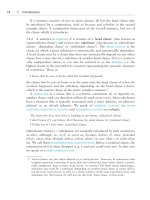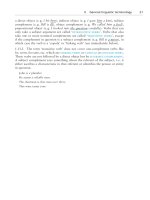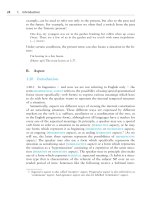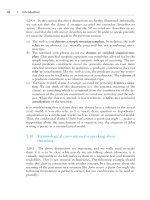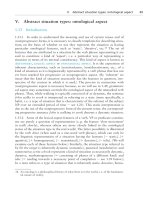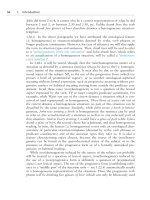The grammar of the english verb phrase part 36 docx
Bạn đang xem bản rút gọn của tài liệu. Xem và tải ngay bản đầy đủ của tài liệu tại đây (74.72 KB, 7 trang )
238 5. The absolute use of the present perfect
5.8.4 When the situation referred to is a repetitive habit (which is a static
hypersituation Ϫ see 1.23.3), the continuative interpretation is ruled out if the
precise number of subsituations making up the hypersituation is specified. This
too has to do with the criterion of nonboundedness, since a specification of the
number of subsituations automatically renders the clause bounded. Compare:
We’ve been eating on the verandah since this spell of good weather started. (continu-
ing temporary habit Ϫ see 5.24.1 below)
*We’ve been eating on the verandah eight times since this spell of good weather
started. (Of course, we can say We’ve eaten on the verandah eight times since this
spell of good weather started, but this clause receives an up-to-now reading, not a
continuative one. As we will see in 5.19.1, the up-to-now reading in question is a
‘quantificational constitution reading’: the sentence answers the (overt or covert)
question ‘How often have you eaten on the verandah since this spell of good
weather started?’)
The reason for this constraint is the following. Since a continuative reading in
which the (potential) full situation may extend beyond t
0
requires the sentence
to be W-nonbounded, this reading cannot be assigned to a sentence specifying
the exact number of times a telic situation has been repeated in the pre-present,
because such a specification entails a bounded (more specifically: bounded-
repetitive Ϫ see 1.49.1) reading. This explanation is also in keeping with the
fact that a bounded representation of a situation is incompatible with an adver-
bial enforcing a continuative reading:
*I have written three books ever since I entered university. (Compare with I have
written three books so far, which is grammatical but cannot receive a continuative
interpretation.)
*I have come to this shop thirteen times for years. (Compare with I’ve come to this
shop thirteen times since then, which receives a noncontinuative reading.)
This restriction is not affected by the use of the progressive form, because
(as noted in 5.29.1) the progressive only renders the individual telic situations
nonbounded, but not the series as a whole:
*I have been writing three books ever since I entered university.
*I have been coming to this shop thirteen times for years.
5.9 Factors triggering a continuative interpretation
5.9.1 Because a continuative reading means that the time of the full situation,
which starts before t
0
, includes t
0
, many languages use the present tense to
convey this interpretation. In Standard English, however, this reading requires
the use of the present perfect when there is a time-specifying adverbial or bi-
functional adverbial interpreted as referring to a pre-present period.
III. More on the continuative reading of the perfect 239
I {have lived / *live} here since 1965.
I {have known / *know} him for a very long time.
I {have already been waiting / *am already waiting} for her for two hours.
An adverbial specifying a period up to t
0
imposes the T-interpretation that the
situation time is co-extensive with the pre-present and in doing so rules out an
indefinite reading. The presence of such an adverbial is, however, compatible
with a continuative interpretation (as well as with an up-to-now one). More-
over, there are adverbials that are compatible with the continuative reading
only. Compare:
The Johnsons have lived in London for three years. (This sentence in principle allows
an indefinite reading, an up-to-now reading or a continuative reading. The last is
the preferred interpretation if the sentence is used out of context.)
The Johnsons have lived in London for three years now. (The presence of now in
the adverbial means that the period indicated can only be a period up to t
0
.The
continuative interpretation is therefore enforced.)
I’ve worked in London since I left home. (naturally interpreted as continuative,
though the other readings are not ruled out)
Since I left home, I’ve worked in London, Durham and Swansea. (The continuative
and the up-to-now interpretations of I’ve worked in London are ruled out by the
other indications of place, at least if the latter are taken to indicate the consecutive
places where I have worked.)
I’ve worked in London ever since I left home. (The continuative reading is imposed
by the addition of ever to the since-clause.)
Ever since I left home, I’ve worked in London, Durham and Swansea. (Because of
ever, the only possible reading is the continuative one, which implies that I have
worked in London, Durham and Swansea simultaneously or alternately, but not
consecutively.)
5.9.2 When the situation referred to is a permanent (unalterable, irreversible)
state, the present perfect sentence will automatically be interpreted as continua-
tive:
He’s been dead for a while. (The indefinite reading is excluded because an irrevers-
ible state of affairs is L-nonbounded and cannot be interpreted as W-bounded. An
attempt to cancel the continuative reading by adding but he no longer is leads to
unacceptability, at least in the world as we know it.)
5.9.3 As we will see in 5.23, when the reference is to a single dynamic (ϭ
nonstatic) agentive situation, it is often necessary to use the progressive form
if a continuative reading is intended. Conversely, the progressive form often
invites a continuative reading because the indefinite reading is not normally
compatible with it, while an up-to-now reading usually needs a context impos-
ing it. Compare:
240 5. The absolute use of the present perfect
I’ve worked hard. (indefinite reading)
I’ve worked hard for a long time. (This allows the indefinite reading ‘Somewhere in
the pre-present there has been a period when I worked hard.’ In the absence of the
progressive, a continuative reading is possible, but only if the situation is interpreted
as a continuative habit (which is a kind of state Ϫ see 1.23.3.). A habitual reading
can also be an unmarked up-to-now reading if the sentence is couched in a suitable
context, as in I’ve worked hard for a long time. [I retired yesterday and I’m going
to enjoy my retirement.])
I’ve been working hard. (Out of context, this receives a continuative reading.)
I’ve been working hard for some time. (The indefinite reading is ruled out because
the sentence is progressive and contains a bifunctional adverbial. Out of context,
the sentence invites a continuative reading.)
I’ve worked hard since I’ve been a member of this club. (Out of context, the sentence
is interpreted as referring to a continuative habit.)
I’ve worked hard since five o’clock. (Out of context, the sentence is interpreted as
referring to a single dynamic situation which started before t
0
and still continues
at t
0
.)
The relation between the continuative perfect and (non)progressive aspect is
explored in more detail in 5.23Ϫ24 below.
5.9.4 In spite of the fact that adverbials like still, these days or nowadays
imply that the situation referred to started before t
0
, these adverbials are not
compatible with a continuative present perfect. The present tense has to be
used instead (because the speaker focuses more strongly on what is the case at
t
0
than on the fact that the situation initiated before t
0
).
It’s nearly dark and they {are still working /*have still been working}.
He doesn’t realize yet that things {are /*have been} different these days.
People {don’t believe /*haven’t believed} in ghosts nowadays.
IV. More on the indefinite reading of the perfect 241
IV. More on the indefinite reading of the perfect
5.10 Further remarks on the indefinite reading
5.10.1 A present perfect receives an indefinite W-interpretation if the sentence
is taken to express that (or to ask whether) a particular situation has or has
not actualized at some indefinite time in a period leading up to (but not includ-
ing) t
0
. The actualization, if any, is considered to be over before t
0
. (Otherwise
the situation would not be located at an indefinite time, for both t
0
itself and
a point adjacent to it are definite times.) Such a sentence thus says either that
there have been no actualizations at all or that there have been one or more
actualizations, none of which includes the terminal point of the pre-present
(i. e. the point immediately preceding t
0
):
[I don’t know whether John is here.] I haven’t seen him yet.
[I’m sure] I’ve met that man before.
I have already fallen out with him.
[I know he’s in London because] I’ve run across him a couple of times.
The observation that the situation time cannot reach up to the terminal point
of the pre-present is in keeping with the observation (made in 5.4.1) that, on
an indefinite perfect interpretation, the time of the predicated situation is by
definition indefinite:
9
if a situation time reaches up to the terminal point of the
pre-present, it is automatically definite because it includes a time (viz. the ter-
minal point of the pre-present) which is treated as definite by virtue of being
adjacent to t
0
. The latter is the definite time par excellence (since it is by
definition ‘given’).
This is not to say that on an indefinite reading the distance between the
situation time and t
0
cannot be very small. Adverbials like just or until recently
locate the situation time very close to t
0
, but at a time which is treated as
sufficiently separated from t
0
to count as an unanchored (indefinite) time. The
idea of separation is especially clear when a present perfect sentence with just
is used to express a contrast with what is the state of affairs at t
0
:
[“Is John in here?] Ϫ “No, he isn’t, but he’s just been here.”
5.10.2 As is clear from the examples in the previous subsection, an indefinite
interpretation is due to the interplay of various factors: the semantic meaning
of the present perfect (ϭ ‘The pre-present contains the situation time’), the
kind of situation referred to (e. g. a punctual situation cannot be continuative)
9. In fact, the term ‘indefinite reading’ of the present perfect is a reflection of this phenome-
non.
242 5. The absolute use of the present perfect
and the absence of elements evoking a continuative interpretation (such as an
adverbial like for three days now, which represents the factual full situation as
including t
0
) or evoking an up-to-now reading. The indefinite interpretation
can also be imposed by the presence of certain adverbials denoting a pre-pres-
ent Adv-time that explicitly excludes t
0
(e. g. just, this minute, ever, before, in
the past), as illustrated by the following examples:
Have you ever been to Nicaragua? (Here the pre-present is conceived of as being the
hearer’s lifetime up to t
0
.)
I don’t believe I’ve heard about it before.
I’ve just received a threatening letter.
Nothing much has been done about it in the past.
T here are further factors that can trigger an indefinite interpretation Ϫ see below.
5.11 The indefinite reading and temporal adverbials
5.11.1 The term ‘indefinite’ perfect reflects the fact that a present perfect
clause can only receive the indefinite reading if it does not contain a time-
specifying adverbial specifying a definite time and if it is not couched in a
context referring to such a time.
10
An indefinite interpretation of the present
perfect is only possible when the precise temporal location of the situation time
of the bygone situation remains indefinite. The moment this location is speci-
fied, the past tense has to be used. Compare:
This morning I {got up / *have got up} at three a.m. (At three a.m. is related to a
particular identifiable day, and is therefore a definite Adv-time.)
[“I got up at three this morning.
You’ve never done that in your life.” Ϫ “You’re
mistaken.] I
have got up at 3 a.m. [Several times.”]
In the former example at three a.m. indicates a definite past time at which the
situation time of the situation expressed by I got up is located. In the second
example, at three a.m. forms part of the description of the situation: the se-
quence ‘I
have got up at 3 a.m. Several times.’ expresses that the situation time
of the situation of my getting up at three a.m. has actualized on several (tempo-
rally unspecified, i. e. indefinite) occasions in the pre-present. In this case at
three a.m. does not establish an Adv-time containing the situation time but
forms part of the description of the situation whose situation time is located
at some indefinite time in the pre-present.
10. In the linguistic literature, the term ‘existential perfect’ is sometimes used in the sense
of ‘indefinite’ perfect. It is inspired by the idea that this kind of perfect expresses that
an actualization has or has not ‘existed’ in a period leading up to now.
IV. More on the indefinite reading of the perfect 243
The following pair of examples also illustrates the rule that (on an indefinite
interpretation) the time of actualization of the situation is never specified or
otherwise identifiable:
I have helped him with his papers. (indefinite reading)
I have helped him with his papers for two years. (continuative or indefinite)
The indefinite interpretation of the second example is ‘Somewhere in a period
leading up to now there has been a two-year period when I helped him with
his papers, but that period is over now.’ This interpretation only arises in
particular contexts, e. g. when the sentence is used in reply to Have you ever
helped him with his papers for two years?, meaning ‘Have you ever done a
two-year stint of helping him with his papers?’ or ‘Do you have experience of
a two-year-helping-him-with-his-papers situation?’. If the sentence is used in
this context, for two years forms part of the description of the situation itself:
‘The situation of my helping him with his papers for two years has actualized
at some indefinite time in the pre-present’. The duration adverbial here does
not just limit a situation in time but is part of the characterization of the
situation referred to. That is ‘help him with his papers for two years’ is what
the speaker is saying he has done. In this respect, for two years is syntactically
similar to at three a.m. in I
have got up at 3 a.m. in the second example of
the previous pair of examples.
The observation that an indefinite perfect use is ruled out by a definite Adv-
time indicating a bygone time is further illustrated by the following:
Have you ever helped him with his papers? (ever ϭ ‘at any time in your life’; we
cannot add a definite past time adverbial like yesterday)
I {helped / *have helped} him with his papers until two years ago. (By specifying
the exact location of the end of the Adv-time, until two years ago indicates a bygone
period whose temporal location is definite because it is anchored to t
0
.)
5.11.2 This does not mean, however, that (apart from the cases mentioned in
the preceding section) an indefinite perfect can never co-occur with a temporal
adverbial. For obvious reasons it can co-occur with adverbials which just de-
note a period leading up to now or denote an indefinite time in a period leading
up to now, without saying anything about the precise location of the situation
time in that period. Adverbials like before, in the past, in the last year, latterly,
of late, etc., can be used in this way:
[Don’t worry.] I have dealt with problems of this kind before.
This has often happened in the past.
Have you had an accident in the last year? (ϭ in the 12 months leading up to t
0
)
Latterly, the firm has had difficulties because of the recession.
244 5. The absolute use of the present perfect
Moreover, the present perfect can co-occur with the adverbials recently, lately,
just and this minute, particularly in British English.
This telegram has just arrived.
I have this minute heard that the deal is off.
I have recently met him.
The company has been sold just lately to an engineering firm.
In this connection, the following remarks are in order:
(a) Just and this minute cannot be used in sentences made negative by not,
except if the not expresses ‘
metalinguistic’ (external, contradictive) ne-
gation
(i. e. when the sentence is used to reject a statement to the con-
trary), or when the not only negates just:
John has just arrived.
[“John has just arrived.”] Ϫ “John has
not just arrived. [He’s been here for hours.]
(metalinguistic negation)
[“John has just arrived.”] Ϫ “John hasn’t ‘just arrived’. [He’s been here for hours.]
(metalinguistic negation)
John hasn’t just arrived. (can only be interpreted as in the preceding example)
John hasn’t
just arrived. [He arrived a long time ago.] (The negation has narrow
scope: it only negates just.)
(b) If recently and lately are to be interpreted as ‘at some recent time within
the pre-present’, they can combine with not under the same conditions as
apply to just and this minute. However, they can also be used in unmarked
negative sentences if they indicate the pre-present zone as a whole rather
than an indefinite time in that zone:
There haven’t been any burglaries here {lately / recently}.
(c) The four adverbials in question (viz. just, this minute, lately and recently)
express recency, and might therefore be argued to refer to a time which is
definite by virtue of being adjacent to t
0
. However, recency is not the same
thing as adjacency. English speakers apparently treat the times indicated
by these adverbials as sufficiently cut off from t
0
to count as indefinite
times, so that they can combine with an indefinite perfect. This is particu-
larly clear from examples like the following:
[If we consider how many billion years the earth has existed,] man has just ap-
peared on the scene, so to speak.
Moreover, these recent times can also be viewed as quite separated from t
0
,
i. e. as past times, so that the adverbials specifying them can also combine with
the past tense:



